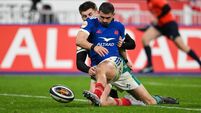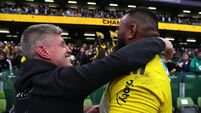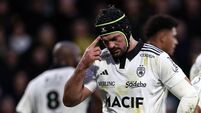Donal Lenihan: Bare-footed All Blacks - how the iconic Barrett brothers found their feet in Meath
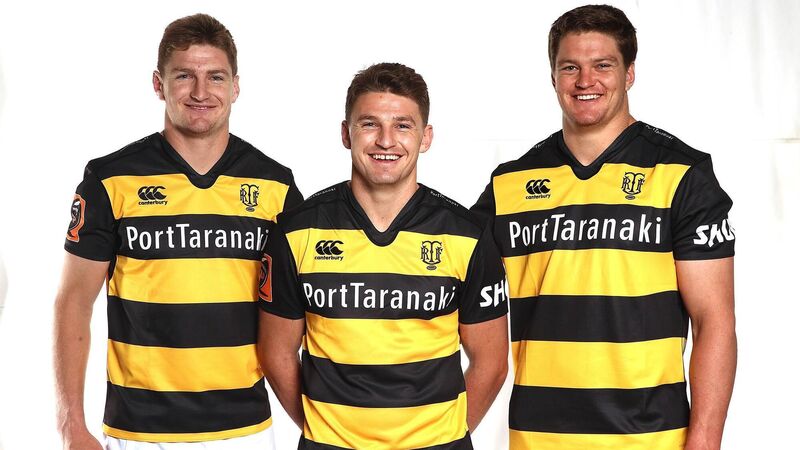
TARANAKI TERRORS: From the left, All Black brothers Jordie, Beauden Barrett and Scott Barrett pose in their provincial Taranaki jerseys in 2017. Pic: Phil Walter/Getty Images
AKING the transition from schools to adult rugby can be challenging but I retain fond memories of my first foray into that cauldron.
Having just led CBC to Munster Schools Cup glory, I gave a commitment to local club Old Christians that I would play for them in the Dennehy Cup, a well-established early-season competition that still operates to this day, before joining UCC once the college year commenced.
I was still 17 when lining out with a grizzled Old Christians pack, all ranging between 10 and 15 years older than me. Yet the most interesting character on the side and the player that stood out for me was the full-back, Mick Murphy.
One of the most iconic images in modern rugby is the sight of the three Barrett brothers — recent Leinster centre Jordie, 2015 World Cup winner Beauden, and current All Black captain Scott — proudly standing side by side awaiting the respective anthems.
What an achievement for one family. Their mother, Robin — an outstanding netball player in her own right — and dad Kevin, affectionately known as “Smiley” from his days as a robust second row and, by all accounts, a bit of a silent assassin with 167 appearances for Taranaki, must be immensely proud.
It’s well known at this stage that the Barrett family relocated to Oldcastle, Co Meath, for a two-year period back in early 2000 to manage a farm. But we’ve never really had the definitive story surrounding how they ended up in Meath.
This is the point where my former Old Christians team-mate re-enters the picture. I knew Mick was heavily involved in the process and caught up with him recently to find out. He’s better at filling in the background than I am.
“In simple terms, I was running a number of dairy units in Ireland and was interested in getting a very good New Zealand couple over on an overseas experience. Why New Zealand? Well, in terms of grass-based dairy farming, New Zealand led the world in the 1960s, ’70s, ’80s, and ’90s. To a fair extent, we’ve caught up now but that was one of the reasons. With a reasonably big unit, four-and-a-half hours drive from my home here in Cork, I wanted to see if I could get a very good couple to control that.
“I’d been going to New Zealand since 1972 for farming purposes, and in the 1990s, I was probably there 12 or 14 times, so I had very, very strong contacts. I put the word out to some close friends, people whose judgement I trusted, and asked if they could identify a good New Zealand couple who wanted an overseas experience.
“So in late 1999, a close friend, John Lynskey from Taranaki, contacted me. ‘I think I found the right couple for you.’ So we then had a period of due diligence that lasted all of two minutes.
“‘Two questions, John. Firstly, what are they like as people?’
“‘You will never meet a nicer family.’”
“He was 100% right. The second, ‘What are they like with cows?’”
“‘They’re grand there too,’” he said.
“So ‘Smiley’ Barrett said I’d better go over to Ireland and check out Murphy. Lynskey replied, “‘Don’t bother, just bring the family.’”
So he did.
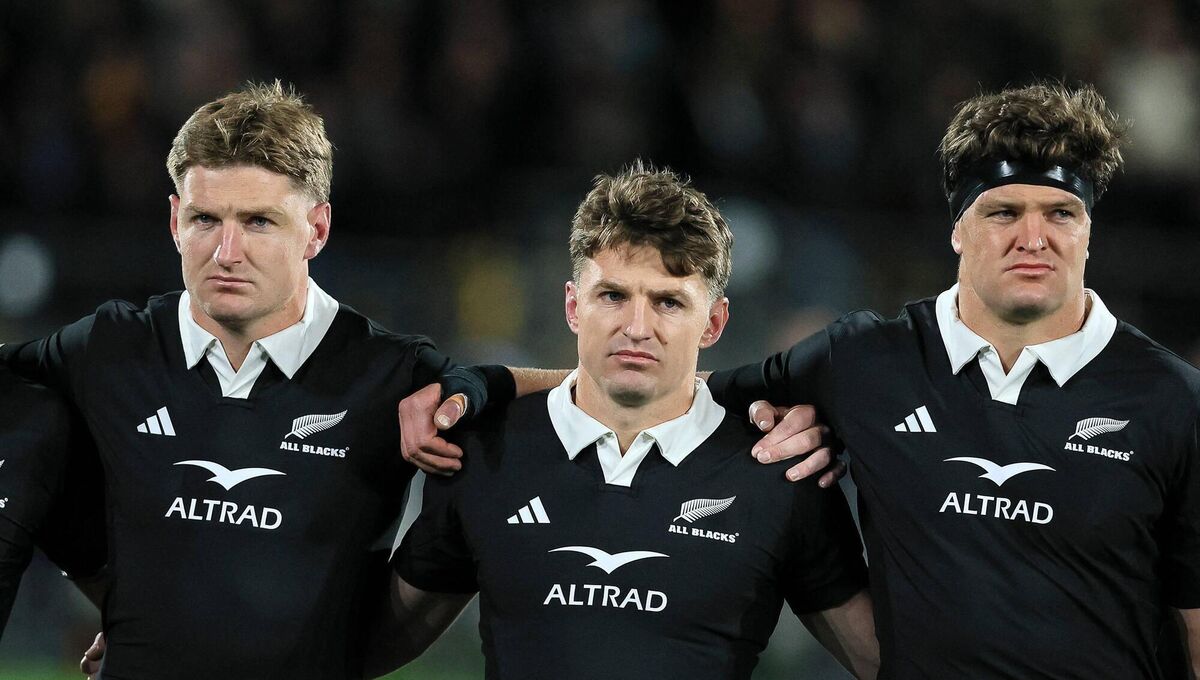
“I think they landed on January 10, 2000. It was one of those unusual days in Ireland when it was barely above freezing. There was frost on the ground all day. I arrived with a people carrier as I knew there was a big gang arriving.
“I didn’t even have a photograph of them. But when a huge bronzed man, very tanned, very muscular, emerged out the door of arrivals in Dublin Airport, in shorts, flip flops, and a t-shirt with a gang of kids dressed similarly, I was pretty sure I had my man.
“They had come straight through from their home in Taranaki, departing Auckland and straight through, bar refuelling, a considerable journey of over 36 hours followed by another hour’s drive out to the farm in Meath.
“When they arrived at the farm and once they stored their things away, I was talking to Smiley and Robin. Straight away, the boys got a rugby ball, threw off the flip flops and went off outside onto the frosted ground in their bare feet. The five lads, including Jordie who was about three years old at the time, 12-year-old Kane, who was the oldest, along with Beauden, Scott, and Blake who ranged somewhere in between. They didn’t appear back to the house for about three hours but came in totally happy. I knew they were a rugby family but that caught me by surprise.”
Last week on his arrival in Chicago, Ireland scrum-half Jamison Gibson-Park said: “I know all the Barretts pretty well from my days in Taranaki, from early on in my club career. I played with Beauden at the Hurricanes and would have known Scott. I also played with Blake and their older brother Kane at the Blues, so I’ve a bit of a connection to that whole family.”
Mick continues: “There was a few eyebrows raised when, in the next few days, the boys turned up at school having walked across the fields in their bare feet. There was probably a few people thinking, you know, Bloody Murphy, he can’t even pay him enough to actually buy shoes.
“But they were used to going in their bare feet when they were at school back home in New Zealand. Once they were beyond a certain age, they went up to New Plymouth, the capital of Taranaki, about an hour away. Robin would stop about two miles from the house and they’d all run home.
“You hear a fair bit about Kevin, but not much about Robin. She was an exceptionally good netball player and was also a marathon runner. So their athleticism comes from both sides. They also have three daughters. In terms of distance swimmers in New Zealand, Jenna is ranked about No. 3 from a mile upwards. The youngest, Zara, has Down syndrome and is a hell of a character. To ensure she developed to her maximum, her parents started a hen enterprise with Zara having full responsibility for feeding and cleaning the hens along with collecting and packaging the eggs. She manages the whole enterprise and dare anyone interfere.”
“Absolutely fantastic. When any of the Barretts come back to Ireland, they pay a visit to Oldcastle to meet old friends. In the local national school they immediately took to Gaelic football. Bodie was about 10 and over the next two years he showed extraordinary talent. He was lightning fast and a very talented Gaelic footballer.”
“Two reasons really. Both Kevin and Robin had Irish ancestry. They weren’t sure exactly from where. It would have been back a good while, more like 1880 or the early 1900s. That was one reason.
"The second was Smiley was a pretty fine rugby player himself with Taranaki. He also enjoyed a spell as a professional with the Hurricanes and played in a Super Rugby semi-final. So when he came over, it would have been very shortly after his season ended, so he was in top condition. He ended up playing with Buccaneers in the AIL for two seasons.”
“It’s a funny story. Smiley never cursed but after about two months, he said to me, ‘Murph, the refs over here are a holy terror — four yellow cards in my first six matches.’
“Now I’d been told that Smiley was the gentlest, a lovely, lovely man. That is except for the first 10 minutes of the rugby match when he always whacked someone to establish who was the boss. If the ref spotted him, he’d always smile, figuring you’re more likely to get a yellow card than a red if you smiled. My comeback was the refs over in New Zealand must be holy terror as I knew he’d accumulated five yellow cards in his last six matches back home.
“Kane is the eldest of the Barretts and a very fine rugby player in his own right. He captained Taranaki and had a contract with the Auckland Blues, but got a couple of bangs in his head and had persistent headaches. He tried to come back several times but, even lifting weights, the headaches would re-occur. Smiley hoped he’d get back playing while Robin was equally hoping he wouldn’t.”
“Very obvious from an early age. When I’d travel to Taranaki, I’d stay with the family and everyone was commenting on how good they were. But, saying that, just how good Beauden turned out was a bit of a shock.
“Kane was a bit of a chip off his father and definitely the most robust of the brothers. He would have been a very good provincial player but for injury. Ironically Scott, the current All Black captain, probably didn’t have the same talent as some of the others, but I’ve never seen anybody work as hard as he did at his game. I’m not surprised he’s ended up as captain of the All Blacks because of his attitude and his character. For such a big man at 6’6”, he’s very, very fast. They’re big lads. Even Jordie is just short of 6’5”.
“About 10 years ago, I actually told Munster — specifically Dougie Howlett and Garrett Fitzgerald — that there was a young Barrett coming along nicely. Jordie was still very young, but some good judges in Taranaki thought he could potentially be as good, possibly even better, than Bodie. While they listened, Munster didn’t do anything about it.”
“Well, it did because the family have a very strong inkling towards Ireland and if Jordie had got an offer at that stage, very likely, he would have come for three or four years. Jordie is extraordinary talented. It was probably a question of would he be a great cricketer, a great golfer, or a great rugby player? He’s that good and excelled in all sports.”
Despite their defeat, Ireland’s first ever win over New Zealand in Chicago nine years ago also marked a special milestone for the Barrett family. Mick takes up the story.
“Very unusually, Robin was in Chicago that day. There needs to be one of them at home on the farm, so Smiley generally gets to go to the matches. On this occasion, however, Robin travelled. Beauden was world player of the year in 2016. Scott made his All Blacks debut that day in Chicago and scored a try off the bench.
Jordie was also on the trip when New Zealand decided to bring two up and coming young players —the other incidentally was Ardie Savea — as part of a wider squad to see what it was like, on and off the field, to be an All Black. It marked the first time all three brothers were part of the same New Zealand squad.
“I was there with my son, courtesy of tickets from Robin. All Beauden said after the defeat was, ‘We’re going to get some bollocking on Monday morning.’ No surprise then that, two weeks later, Ireland felt a serious backlash in Dublin when the All Blacks delivered a massively physical response in a comprehensive 21-9 victory.”
“I have to say I’m delighted to know them. I never really talk about it because we’re great friends. It’s an amazing feat for the one family to have three multi-capped All Blacks and they’re all bloody good. World-class in fact. But strangely enough, I’d be equally impressed by the fact that, with eight kids, they are the most united, harmonious family I’ve ever seen. I said it to Smiley and Robin only in the last three or four years that, for a family with so many stars, it’s amazing there’s not a trace of envy or jealousy or anything like that.
“They’re a terribly tight family and, remember, I’ve seen them up close. You’d never hear a row. One day I asked how come. The parents just exchanged glances and thought back to a conversation a long time ago.
“Smiley thought for a while and said that when they got married, they were both in agreement that they wanted to have lots of kids. If you’ve lots of kids and you’ve lots of rules, you’ll always be chiding somebody. So they decided on just one guiding principle — look after each other. They’ve certainly done that. That’s what I was told from the outset and it’s exactly true. You’ll never meet a nicer family.”
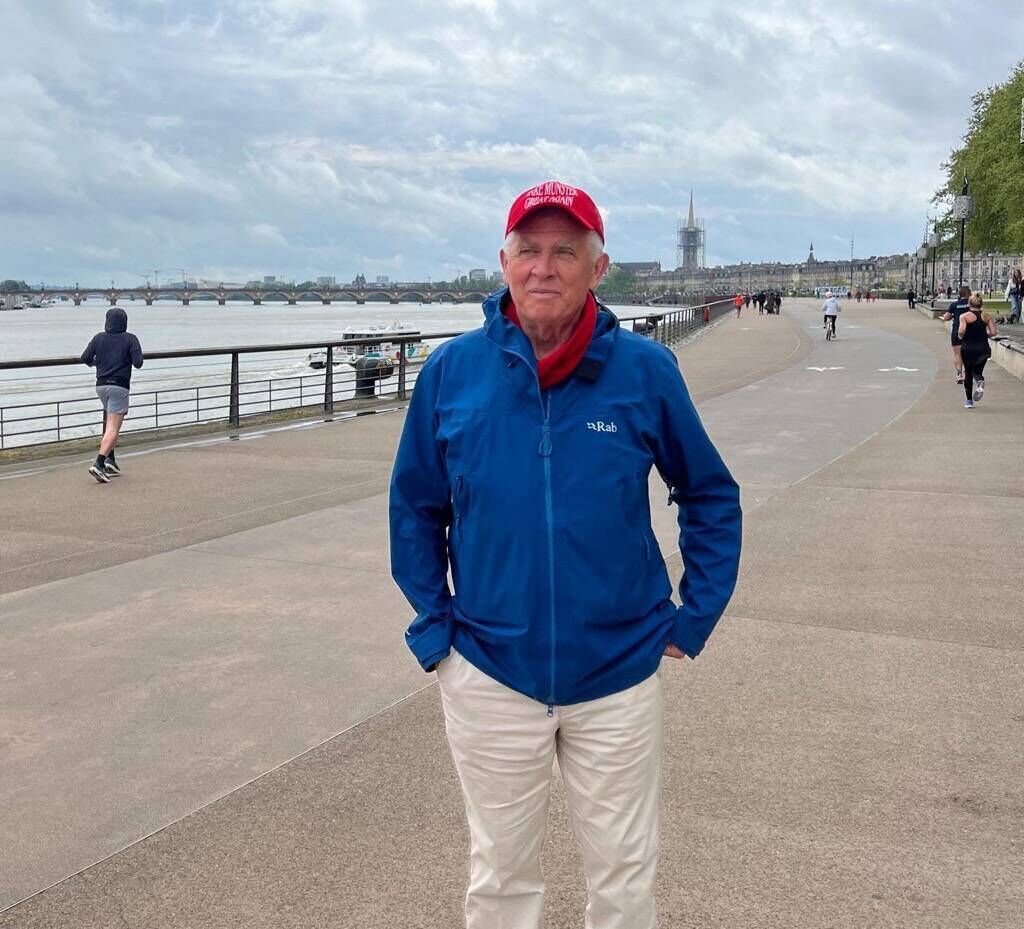
Mick Murphy was the first of many amazing characters I went on to meet over the course of a lifetime spent immersed in rugby. He knows what he’s talking about. I sent him a text on Monday referring to Saturday’s rematch in Chicago and to let him know our chat would be appearing in today’s
Incidentally, he’s staying with the Barretts in Taranaki this weekend, watching the match in enemy territory. How appropriate.
The Dennehy Cup? Having never lost a Munster cup match at junior or senior level with CBC, I learned the first of many valuable lessons as my career in adult rugby was launched that September with Old Christians. Having taken some notable scalps including UCC and Cork Con, not once but twice (a story for another day), we were eventually beaten in the final by Dolphin. In sport, there’s no such thing as entitlement.
I suspect Andy Farrell appreciates that more than most as Ireland launch what is likely to be a very demanding but informative November series, with the Barrett brothers once again sure to pose a collective obstacle to Irish
aspirations.

